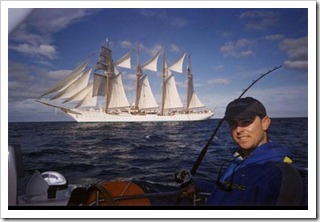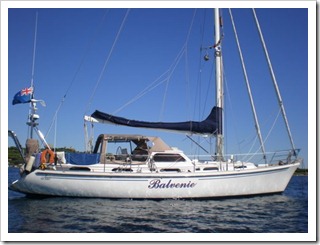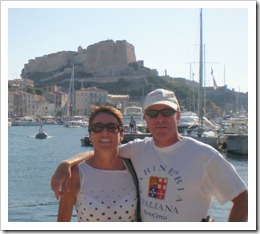
Bill Dietrich has been cruising since 2001 aboard Magnolia, a 1973 Gulfstar 44 motor-sailor ketch hailing from Miami, FL, USA. Over those years he has cruised the Florida Keys, Bahamas, USA East Coast, Turks, Dominican Republic, Puerto Rico, Virgin Islands, Leeward Islands and Windward Islands. He is single, started cruising at age 43, is now age 52, and Magnolia is his first vessel owned. You can read more about Bill on his
website.
What is something you think potential cruisers are afraid about that they shouldn't fear? And what is something potential cruisers don't worry about that perhaps they should?
I guess everyone is afraid of piracy or attacks these days, with them in the news so much. There have been some incidents in Venezuela and Honduras recently, I think, but other than that I think the Caribbean is pretty safe. If I were a potential cruiser, I wouldn't worry about that.
Maybe people worry about being seriously ill while on the boat and outside the USA. Recently I had a kidney-stone attack while on the boat in Martinique, and I don't speak French. I spent 8 hours in an Emergency Room, got care as good as any in the USA, and the total bill was $250. Now, being seriously ill in a more isolated place, and especially if singlehanding, would be worse. But I'd worry more about getting hit by a car in the USA than about getting ill on a boat while cruising.
People should think more about the little things that can bite you. On a delivery a couple of years ago, I slipped on a wet, rolling swim platform with no handholds, crashed down on my back across the edge of the platform, and ended up in the water. I got away with a badly bruised back, but I could have broken vertebrae, or hit my head and drowned. Everyday activities such as raising anchor or operating the dinghy could cause major injuries if you're unlucky. About eight years ago, I met a couple in the Chesapeake who had sailed up from South Africa with no problems. In the Chesapeake one day, the lady was on the foredeck to take down the jib. A jib-sheet wrapped around her leg and yanked her into the air, upside-down. She got away with deep rope-galls to her leg, but she could have had her brains bashed out against the deck.
What do you find most exciting about your cruising life?
The most exciting thing is just that I've "broken out of the rut" and am living a new lifestyle. At age 40, I found myself living in apartment and cubicle, doing the same old things at work and the same mostly-fun things on the weekends. Now, I have totally changed my life and lifestyle, am seeing new places and learning and doing new things. And there are a hundred other possible lifestyles waiting out there if I ever get tired of cruising. The sense of freedom and possibilities is pretty exciting.
And it's fun to hear from family and friends and strangers who marvel that I am doing this. Some of them say "we plan to be cruising too in another 5 years or so". Many of them have a "that's really cool, but I'm glad you're doing it instead of me" attitude. And my Mom still thinks I'm crazy for giving up a career and paycheck and medical insurance, and doesn't see why anyone would create a web site and expose their life to the public. But that's Mom.
In your own experience and your experience meeting cruising couples, can you convince a reluctant partner to go cruising and if so, how?
I'm not the best person to answer this, being a single guy. I had a reluctant girlfriend follow me onto the boat for a few months, and she left both because she didn't like cruising, and because our relationship was not that solid to begin with. I was ready to end my career, and she wasn't ready to end hers. She had created a nice living situation back in California, and I hadn't. She had an aging father to be with. Lots of reasons.
I'd guess your relationship with your partner would have to be pretty solid to overcome reluctance. Of course, money might cure a lot of the problem. An expensive boat with lots of amenities would make the reluctant partner happier. Frequent plane-trips back to see family and friends would help. Lots of wining and dining and excursions would help.
Be very careful in this area. Buying and then having to sell a big boat not long afterwards could cost you a lot of money. Ending up with an unhappy wife would be very bad. Finding that the guy loves cruising and the wife hates it may be fairly common.
Are you attracted more to sailing itself or cruising-as-travel and has that changed over time?
I'd say my highest focus is "living comfortably", followed by "seeing new places", followed by "sailing". I'm perfectly happy spending a month or two somewhere with a comfortable and safe anchorage, nice weather, a little snorkeling, maybe some decent radio, lots of time to read books, some internet, a supermarket nearby, decent prices. I'm living my life most of the time, just being "everyday me".
But I get itchy after a month or two, and it's fun to move to somewhere new, explore it a bit, meet some new people. So the "travel" part of it is fun, but secondary to the "living comfortably" part. Frankly, new islands are interesting, but they're kind of limited. Not a lot of history or museums or libraries or culture, compared to the USA. Yes, they each have their own share of each, but not in the quantity and depth you'd find in the USA or Europe. In my opinion, in the whole of the NE and E Caribbean down to the Grenadines, maybe the really good historic sites can be counted on one hand: old San Juan PR, the forts of St Croix, English Harbor Antigua, the fort at Iles des Saintes Guadeloupe. And the local people are nice, but frankly they're not as interesting as the other cruisers ! Many of the local people haven't been out of their own country, maybe they're not very well-educated, and they're living the conventional kind of life that us cruisers left behind.
Further down the list for me is "sailing". Yes, it's a rush to turn off the engine and sail, and a feeling of accomplishment when you arrive. Maybe if my boat sailed better, I'd be more interested in the sailing aspect of this life. But I probably spend 10-20 days at anchor for every 1 day moving.
What is something that you read or heard about cruising, that you didn't find to be true?
Before I started cruising, I read everything I could get my hands on, and such a variety, that I think I had a fairly accurate picture of cruising. So I can't say that I had any major misconceptions.
I will say that cruising magazines focus way too much on new boats, and cruising guidebooks focus way too much on marinas and restaurants. Maybe I'm outside their target audience; I have plenty of money but I'm trying to live on my savings for the rest of my life, so I try to live cheaply. I suppose the magazines and guidebooks get their advertising from boat-builders and restaurants, so they follow the money.
I guess a surprise to me was how little exercise I get while living on the boat, unless I make a big effort to go exercise. On land, I played tennis and hiked and bicycled. On the boat, I find myself sitting and reading. Tennis is out, many island roads are too dangerous or hilly to bike or run on, and hiking is hit-or-miss. Snorkeling isn't very strenuous. Often the effort of closing up the boat, launching the dinghy, getting ashore, then having to reverse the process, is enough to keep me vegetating on the boat.
On the other hand, raising anchor by hand from 30 feet can leave the heart pounding, there are nice hikes on some islands, and I eat more healthily than I used to. I biked a fair amount when I was cruising the USA and Puerto Rico. I walk a lot on islands, not having a car, but distances aren't great.
Describe a perfect cruising moment that will make cruisers-to-be drool with anticipation.
I'm striking out a bit on this one. Dolphins playing under the bow as I motored down the inside of the Florida Keys ? Sitting in Baltimore harbor on July 4th and watching fireworks from half a dozen different cities ? Cruising down the Mississippi and feeling the Civil War history and the travels of Mark Twain ? Anchoring my sailboat in Jamestown VA, next to the replicas of the sailboats that brought the Jamestown settlers across ? I've had those experiences.
I'd love to see whales from my boat, but I haven't. Always wanted to see a space-shuttle launch from my boat, but I was never in the right place at the right time. Would like to see a nuclear submarine in the wild.
Lots of smaller, quiet moments. Nice sunset while sitting on the boat in a comfortable anchorage, full of a good dinner and a little buzzed from a rum-and-coke. Satisfaction of figuring out something and accomplishing a repair job. Reading a book picked at random out of a book-exchange and finding out it's a great book. Having a really nice conversation with a couple of cruisers you just met and probably will never see again. Snorkeling and seeing squid hovering in small packs.
What has been the most affordable area to cruise and the most expensive? What was affordable or expensive about each area?
The USA was the most affordable, except that river or ICW trips mean a lot of motoring. And of course I stayed out of marinas and off moorings.
In the Caribbean and just north of it: Bahamas are expensive (govt fees, food, fuel, everything). Dominican Republic has expensive govt fees. The French islands have expensive fuel.
But you can save by being smart. My boat has a big fuel tank and lots of storage space, so I can buy fuel and food where they're cheaper. I catch rainwater, so I don't have to buy water. I stocked up in USA before going to Bahamas; I stocked up in St Thomas before going to British Virgin Islands. [That's one reason it's hard to answer the "how much does it cost ?" question; some months I'll spend a lot of money while stocking up, then spend nothing for a while.]
Another big expense: plane flights back to USA a couple of times a year. They get more expensive as you get to more isolated places. And sometimes two adjacent islands will have hugely different airfares to the USA, maybe a 2-1 ratio. [I've found I need a "vacation from the boat" twice a year: once at Christmas and once in the summer. Great to get off the boat, to reconnect with my family, and to enjoy modern conveniences.]
The bigger factors are independent of where you cruise. Stay out of marinas and restaurants and bars, and stay off paid moorings. Do as much of your own repair work as you can. Those strategies will save you TONS of money; savings on fuel and food pale by comparison.
What did you do to make your dream a reality?
I had an easier time of it than most people. I was single, living in an apartment, with lots of money saved up. So for me, the biggest hurdle was the sheer willpower needed to make a major change in my life. It's a big, scary change, no doubt about it. Ending a career, giving up steady paycheck and medical insurance, moving across the country, moving onto a boat. I was a bit wacky, mentally, the first couple of months aboard the boat. Had I made a big mistake?
I've met people who say they plan to cruise, and they have a family and pets and a business and two houses and mortgages and eight vehicles. I don't know if they're going to do it. The hurdle may be too high.
And full-time cruising on a big boat is not for everyone. There are lots of ways to have fun with boats. Maybe day-sailing, or trailer-sailing, or kayaking. Maybe occasional chartering.
I'm very glad I started cruising when I was fairly young, age 43. I've met older people who want to cruise, but their health just won't allow it. And the change from conventional life to a new lifestyle can be traumatic; now I know why guys retire at 65 and die from a heart attack a few months later. I met a nice 65-ish couple on a boat in Miami harbor. He had retired six months earlier, they'd started cruising, and then he'd had two heart attacks. Their cruising plans were in ruins.
How would you recommend that someone prepares to cruise?
I tell people: as soon as you start even thinking about going cruising, start simplifying your life. Sell everything down to the bare minimum, and then sell beyond that. Ideally, sell the house and move into an apartment. The process could take years.
And at the end of it, suppose your dream changes and you no longer want to go cruising ? You now have a much simpler life, and that opens up all kinds of options you didn't have before. Now you can decide to travel by plane or RV, volunteer a la the Peace Corps, or any other life you choose. You are free from the burden of all those possessions you used to have.
Another thing: stop spending ! The best way to save money is to not spend it. Stop going to restaurants and bars, stop buying clothes, quit smoking, stop buying CDs and magazines and books. Cook your own meals, drink at home, use the library, take up cheap activities such as running or hiking or bicycling.
Get a boat later, rather than sooner. You don't want to have a big boat sitting in a marina slip for months or years while you try to sell your house and simplify the rest of your life. A big boat demands a lot of your time; juggling a boat, house, job and family at the same time won't work. You can repair and upgrade the boat as you do your first short cruises; it doesn't have to be perfect before you can move aboard and cruise.
I took sailing lessons for a year in SF Bay, and then used the school sailboats for another year. That was very worthwhile, and I'd recommend it. But getting the boat to move and navigating it aren't very difficult, really. I spend more of my time cleaning the boat and repairing things. Now and then I hear from would-be cruisers who are nervous about navigation; they shouldn't be.
What question do you wish I would have asked you besides the ones I've asked you and how would you answer it?
What is it like to live and cruise on a boat?
It's a very individual thing, and it's what you make of it. It depends on your circumstances (marriage, money, personality, health, skills) and your choices (location, boat, lifestyle, interests) and chance (weather, daily experiences, adventures, adverse events). Probably no two cruisers cruise exactly the same way. And you can change the way you cruise, as needed. Maybe you'll acquire a partner, lose your existing partner, decide to change boats, change locations, maybe decide you can afford to spend more, maybe you'll run short of money.
Some things are harder to change than others. I dread the day I ever try to sell my boat; some people seem to buy and sell as if it's a casual activity, but selling seems really hard to me. Money is as much of an issue for cruisers as it is for everyone else. Your personality won't change overnight just because you start cruising; don't expect to suddenly become a "party animal".
Before I started cruising, I thought I might be tired of it after five years or so. But I've found it's getting better and better. I'm close to the 10-year mark, and I don't foresee giving up this lifestyle any time soon. I've seen maybe 10% of the Caribbean, so there's plenty of new territory left. [I have no desire to cross oceans.] Cruising has lots of ups and downs, like any other lifestyle. Sometimes it's hot and humid and buggy and the anchorage is rolly and it seems like half of the stuff on the boat is broken. And as I said earlier, it's not for everyone. But often it's wonderful, and it's changed my life for the better. I'm very glad I'm cruising.
 Andreas Julseth and friends cruised from 2008 to 2010 aboard African Innovation, a FastCat 435 (43’) hailing from officially from Durban, South Africa but unofficially from Stavanger, Norway. He cruised through Europe, Caribbean, Central America, Galapagos, South Pacific and Australia. Readers can learn more through his website or through email (andreas@julseth.com).
Andreas Julseth and friends cruised from 2008 to 2010 aboard African Innovation, a FastCat 435 (43’) hailing from officially from Durban, South Africa but unofficially from Stavanger, Norway. He cruised through Europe, Caribbean, Central America, Galapagos, South Pacific and Australia. Readers can learn more through his website or through email (andreas@julseth.com).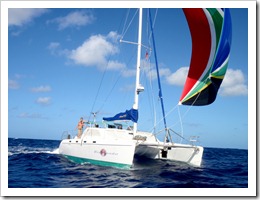 Tell me your favorite thing about your boat
Tell me your favorite thing about your boat 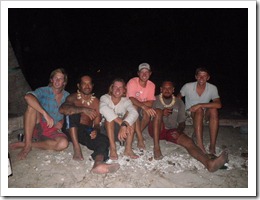 In your experience, how much does cruising cost?
In your experience, how much does cruising cost? 